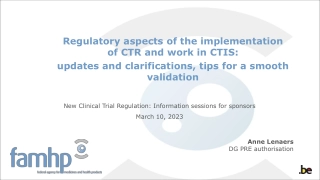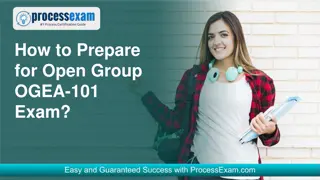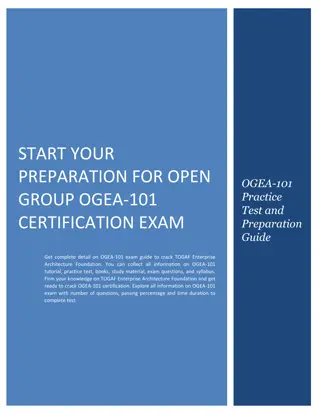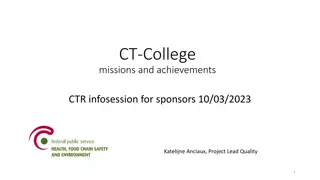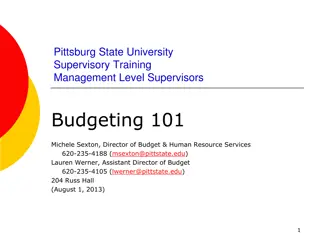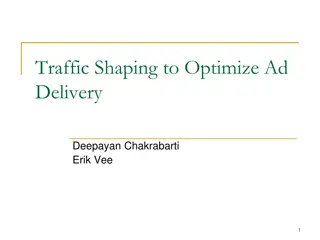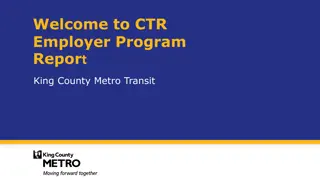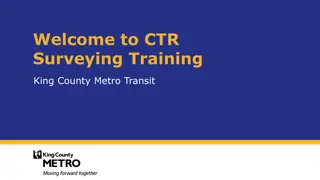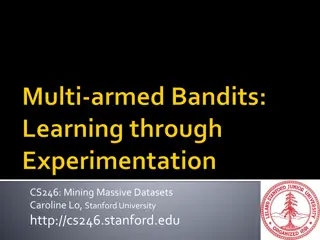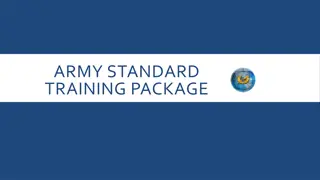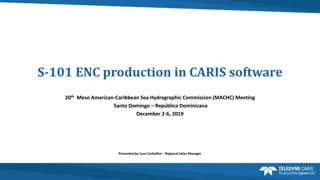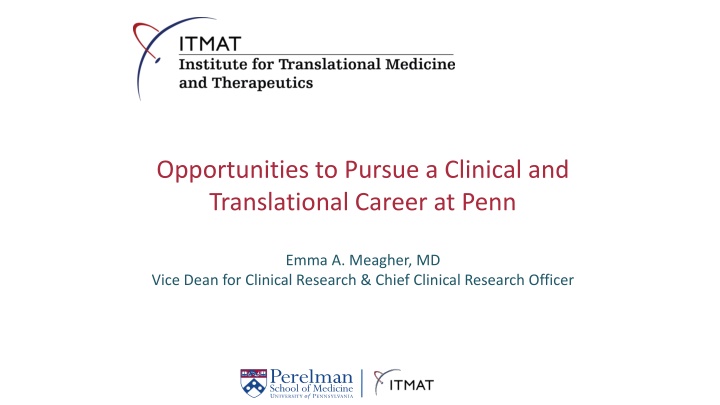
Clinical and Translational Career Opportunities at Penn - Insightful Guide
Explore the education pathway, career planning, levels of engagement, and more in pursuing a clinical and translational career at Penn as detailed by Emma A. Meagher, MD, Vice Dean for Clinical Research & Chief Clinical Research Officer. Gain valuable insights into the evolving research landscape and the interface of academia and healthcare.
Download Presentation

Please find below an Image/Link to download the presentation.
The content on the website is provided AS IS for your information and personal use only. It may not be sold, licensed, or shared on other websites without obtaining consent from the author. If you encounter any issues during the download, it is possible that the publisher has removed the file from their server.
You are allowed to download the files provided on this website for personal or commercial use, subject to the condition that they are used lawfully. All files are the property of their respective owners.
The content on the website is provided AS IS for your information and personal use only. It may not be sold, licensed, or shared on other websites without obtaining consent from the author.
E N D
Presentation Transcript
Opportunities to Pursue a Clinical and Translational Career at Penn Emma A. Meagher, MD Vice Dean for Clinical Research & Chief Clinical Research Officer
What does the Education Pathway look like? Medical School Residency & Subspecialty Training In parallel or in sequence? Research Training -Apprentice Model or Formalized Program Non-Research Training -MBA, JD, etc
The Shifting Interface of Academia and Healthcare Integrating the translation of discovery into medical education The Learning Health Care System Large Data Academic Partnerships/Consortia Team Science Science of Healthcare Economics Science of healthcare operations on outcomes
Definition of Clinical Research The Evolution of the Research Landscape Clinical Research Clinical Trials Observational Studies Pragmatic trials Proof of Concept Animals Proof of Concept Humans Basic Research + Translational Research Innovation + **The Learning Health Care System Health Sciences Policy + Health Systems Research
Career Planning - Academic Tracks Academic Clinician Clinician Educator Research Tenure
Evolution from Reliance to Independence Provide the training Provide the funding Provide the mentoring Provide the infrastructure Meagher EA,. Clin Transl Sci. 2011 Oct;4(5):353-8.
Levels of Engagement for Translational Research Education Masters Programs Certificate Programs Introduction to Clinical and Translational Research
MTR 510: Intro to Clinical & Translational Research Course Director: Emma Meagher, MD Offered Fall Term, M/W, 4:00 -5:30 PM Open to nondegree students Module 1: Research Methods & Protocol Development Module 2: Regulatory Environment for Clinical Trials. Upon completion, students should have a strong foundation in the fundamentals of clinical research and should be able to apply contemporary research tools to clinically relevant areas of investigation.
Certificate in Clinical Research - Epidemiology Requirements 4 courses totaling a minimum of 3 course units which must include: Epidemiology research methods/study design Biostatistics for epidemiology Practical applications of Epidemiology Research Scientific and Ethical research conduct Completion of 2 online Collaborative Institutional Training Initiative (CITI) units Two pathways: Non-credit - only available to Penn Credit - Staff and faculty or anyone external to Penn. For More Information: https://www.med.upenn.edu/cceb/edu/nd/certificate.shtml ccebcert@mail.med.upenn.edu
Master of Science in Clinical Epidemiology Primary objectives is to produce a cadre of skilled investigators trained to conduct epidemiology studies. Designed to be completed in two to three years of full-time study (14 c.u. required) Generally, first year students devote their time to the "core courses" and the writing of their thesis protocol In the 2nd and 3rd years of study students complete electives and conduct their thesis projects. General Inquiries: Jennifer Kuklinski, jkuklins@mail.med.upenn.edu Admissions Inquiries: ceuapps@mail.med.upenn.edu http://www.cceb.med.upenn.edu/master-science-clinical-epidemiology-msce
ITMAT Certificate Program In-depth training in Clinical and Translational Science Certificates in Translational, Entrepreneurial, and Regulatory Science Requirements 4 c.u. of coursework, one-year engagement in CTR research project, and active mentorship MTR 510 and MTR 600 are required for all certificates Elective courses are based on selected certificate For more information and to apply: http://www.itmat.upenn.edu/certificate/
Master of Science in Translational Research Provide training in translational research by combining didactic and experiential learning in a structured degree program Prepare students to think critically to pose and answer research questions Provide instruction in grant and manuscript writing Prepare students to execute research proposals Curriculum Prepare students to evaluate the translational impact of their research Curriculum 80% of time on the research project Career Development & Mentorship Didactic course work, wet and/or dry lab based learning Research Career development and mentoring Project Team Mentoring Approach Professional Development Core
MTR Concentrations Discovery: For students who are connecting the basic science of disease with human medicine. Projects may be proof of concept in cell or animal models or human samples. Biomedical Informatics: For students who are adopting informatics methodologies to develop and test their own hypotheses. Discovery Translational Therapeutics and Regulatory Science Core Courses Biomedical Informatics Translational Therapeutics: For students who are testing discoveries for clinical effect. Projects may be first in humans, phase 1, or assessing the safety, efficacy, quality, and performance of regulated products. Entrepreneurial Science: For students who aim to navigate both business and academic environments as you conduct research and consider commercialization opportunities. Entrepreneurial Science
From Reliance to Independence Provide the training Provide the funding Provide the mentoring Provide the infrastructure
ITMAT Community Education Research Mentor Training To develop mentoring skills in Penn and CHOP research faculty Junior Investigator Symposium Late stage post docs/clinical fellows & early stage faculty at Penn and CHOP focused on successful career strategies for a career in CTS Clinical and Translational Research 101 To introduce new residents and fellows at Penn and CHOP to the CTS landscape on campus Career development workshops with Pharma CTS Professional Staff Masters in Regulatory Affairs
From Reliance to Independence Provide the training Provide the funding Provide the mentoring Provide the infrastructure
Protecting time for students to train Maintaining 80% protected time and securing tuition support Departmental T32s ITMAT Fellowships Internal Foundation Grants 2017 MTR MATRICULATES, 24 TOTAL NIH KL2 and TL1 Awards ITMAT, 2 8% KL2, 3 13% Dept T32/Tuition Benefits, 1 4% Postdoc TL1s, 7 29% Predoc TL1s, 11 46%
From Reliance to Independence Provide the training Provide the funding Provide the mentoring Provide the infrastructure .
Infrastructural Support Enabling CTS Monitoring/ Compliance Program Financial Operations IT Infrastructure Clinical Trials Contracting Tech Transfer / Business development Necessary support Sponsor IND/IDE Support Community Engagement Clinical Research Operations Professional development core

